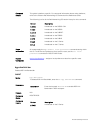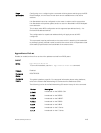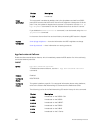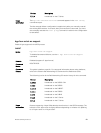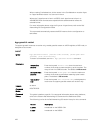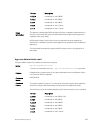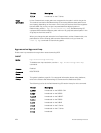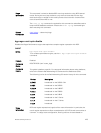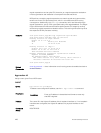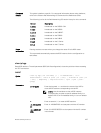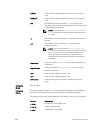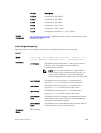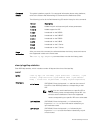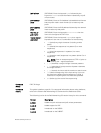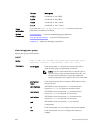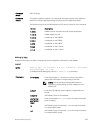
regular expressions can be quite CPU intensive, as a regular expression evaluation
involves generation and evaluation of complex finite state machines.
BGP policies, containing regular expressions to match as-path and communities,
tend to use much CPU processing time, which in turn affects the BGP routing
convergence. Additionally, the show bgp commands, which are filtered through
regular expressions, use up CPU cycles particularly with large databases. The Regex
Engine Performance Enhancement feature optimizes the CPU usage by caching
and reusing regular expression evaluation results. This caching and reuse may be at
the expensive of RP1 processor memory.
Examples
Dell(conf-router_bgp)#no bgp regex-eval-optz-disable
Dell(conf-router_bgp)#do show ip protocols
Routing Protocol is "ospf 22222"
Router ID is 2.2.2.2
Area Routing for Networks
51 10.10.10.0/00
Routing Protocol is "bgp 1"
Cluster Id is set to 10.10.10.0
Router Id is set to 10.10.10.0
Fast-external-fallover enabled
Regular expression evaluation optimization enabled
Capable of ROUTE_REFRESH
For Address Family IPv4 Unicast
BGP table version is 0, main routing table version 0
Distance: external 20 internal 200 local 200
Dell(conf-router_bgp)#
Related
Commands
show ip protocols — views information on all routing protocols enabled and active
on the E-Series.
bgp router-id
Assign a user-given ID to a BGP router.
S4820T
Syntax
bgp router-id ip-address
To delete a user-assigned IP address, use the no bgp router-id command.
Parameters
ip-address Enter an IP address in dotted decimal format to reset only
that BGP neighbor.
Defaults The router ID is the highest IP address of the Loopback interface or, if no Loopback
interfaces are configured, the highest IP address of a physical interface on the
router.
Command
Modes
ROUTER BGP
426
Border Gateway Protocol



